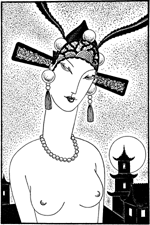[Transcriber's Note: This book was publishedas Chinese Love Tales in 1935 (translated from the original of GeorgeSouile De Morant - a variation in the spelling of the middle name). Itwas attacked and acquitted in the courts, winning judicial recognitionof its exceptional literary merit.]
Eastern Shame Girl
Translated from the French of
George Soulie DeMorant
Illustrations by
Marcel Avond
New York
Privately Printed 1929
CONTENTS
The Error of the EmbroideredSlipper
The Monastery of theEsteemed-Lotus
Note:—The original source of the stories appearing in"Eastern Shame Girl" is the classic literature of China in the 17thCentury.
EASTERN SHAME GIRL
When there is a great peace
Under the gold cup of the sun
Joy reaches its flowering.
In the twentieth year of the period Wan-li, there came, amongthe thousands of students who gathered at Peking for theexaminations, a certain Li, whose first name was Chia and hissurname Ch'ien-hsi, or "Purified-a-thousand times." His family werefrom Shao-hsing fu in Chekiang; his father was Judge of theprovince of Kang-su; and Li himself was the eldest of threebrothers. He had studied in the village school from childhood and,not having yet attained to literary rank, had come, according tocustom, to present himself for examination at Peking. While in thatcity, he consorted, before his springtide, with the younglibertines, the "willow twigs" of his country; and, in order togain experience, frequented the theatres and music-halls. Thus hebecame acquainted with a famous singing girl called Tu, whose firstname was Mei, or "Elegance." As she was the tenth of her family,she was known at the theatre as Shih-niang, "The Tenth daughter." Adelicate seduction diffused from her: her body was all grace andperfume. The twin arches of her brows held the black which is blueof distant mountains, and her eyes were as deep and bright asautumn lakes. Her face had the glory of the lotus, and her lips theglory of cherries. By what blunder of the gods had this piece offlawless jade fallen in the windy dust, among the flowers beneaththe willow? When she was thirteen years old, Shih-niang had already"broken her claws." Now she was nineteen, and it would not bepossible to enumerate the young Lords and Princes whose hearts shehad besotted, whose thoughts she had set in a turmoil, whose familytreasures she had swallowed without compunction. In the theatres,they had composed an epigram about her:
When Tu Shih-niang comes to a banquet
The guests drink a thousand great cups
Instead of a single small one.
When Tu Mei appears upo
